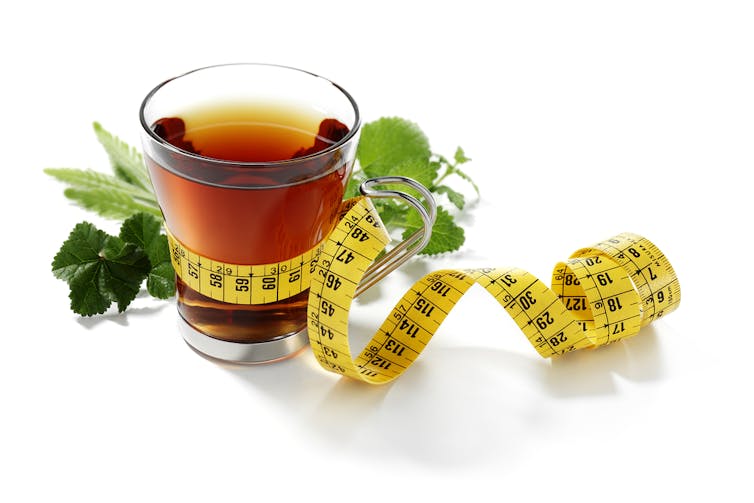Science or Snake Oil: do skinny teas boost weight loss?
- Written by Clare Collins, Professor in Nutrition and Dietetics, University of Newcastle
Weight loss teas are becoming common, with advertisements claiming dramatic results often appearing online. Do the big promises match the results, or do they only match the price tag?
A search of the medical research database pubmed found there are no studies specifically on the use of “slimming teas” for weight loss, but there are studies on green and black tea.
One review of five research trials compared changes in body weight in more than 300 adults at high risk of type 2 diabetes and heart disease. They gave people either green tea, a fermented tea called Puehr or tea extracts and compared the weight change to people who were given either placebo (non-active) tea extracts or no tea at all.
They found that in the group of people who had the most risk factors for type 2 diabetes and heart disease, and who also ate more healthy foods and exercised more, those having the tea or tea extracts had a weight reduction of about 4kg. Interestingly, in the group who were not given healthy lifestyle advice and who did not have many risk factors, the average weight loss was only about 350 grams.
Read more – Health Check: six tips for losing weight without fad diets
These results suggest most of the weight loss was due to the impact of following the healthy lifestyle advice, and that there may have been some extra motivation to stick to that advice among those who were at high risk of other health problems.
An analysis of six studies examined the effect of tea mixtures that contain added catechins (a chemical compound found in tea that have a bitter flavour) and caffeine or caffeine-only supplements on the body’s energy expenditure. They found both significantly increased the amount of energy the body burns over the day, by approximately 5%. That may not sound like much, but it’s equivalent to about 430 kilojoules per day, or the kilojoules in a medium banana.
In another review of the effects of green tea and added tea extracts on body weight regulation, consuming green tea with the tea extract added was associated with a 1.3 kilogram greater weight loss compared to not consuming them over about three months.
Slimming teas can have herbal tea components, herbal extracts or other additives mixed in with the tea. There’s limited good quality research on the effectiveness of these compounds, although some have been around for decades. But there has been a case report of heart failure triggered from using a herbal weight loss tea that was thought to have illegally contained weight loss drugs known to cause heart problems, so caution must be exercised.
 It’s important to look at what’s in the tea you’re drinking.
from www.shutterstock.com
It’s important to look at what’s in the tea you’re drinking.
from www.shutterstock.com
Read more – Health Check: what’s the best diet for weight loss?
Botanical compounds that might be added to slimming tea include the following, so check the label:
Senna, a laxative used to treat constipation;
Valerian root, which has some evidence that it may improve sleep quality;
Roots of the burdock plant, which are thought to contain chemicals that act as a diuretic (and increase urine production);
Yerba mate, a plant common in South America. The leaves are used to make a drink high in polyphenols, a group of compounds found in plants that help the body defend itself against disease. Yerba mate also contains caffeine, so it has a stimulatory effect similar to coffee. A recent review suggests it may be helpful in lowering blood cholesterol levels;
Dandelion leaf contains chemicals thought to have a diuretic effect, but there’s no strong evidence to support this effect;
Celery seed can be used as a spice or flavouring, the active ingredient apiole has been thought to have anti-cancer effects (in mice); and
Calendula flowers are edible and a review of their medicinal use through out history found potential wound healing and anti-swelling properties.
As long as you do not have any sensitivities or a chemical intolerance to slimming tea components, they might have a powerful placebo effect and act as a timely reminder to stick to a weight loss diet. Interestingly, the placebo effect is supported by evidence.
While the price of slimming teas vary, check the small print for disclaimers before you part with your money. They might read something like:
For maximum health benefits this product should be consumed in conjunction with a low kilojoule diet and daily exercise, individual results may vary.
Think about whether you get better value from A$30+ dollars worth of weight loss tea or from buying a regular box of green or black tea, and spending the price difference on buying more fruits and vegetables. The research evidence indicates higher intakes of fruit and vegetables are associated with a lower risk of weight gain, heart disease, type 2 diabetes, some specific types of cancer and age-related health decline.
Authors: Clare Collins, Professor in Nutrition and Dietetics, University of Newcastle
Read more http://theconversation.com/science-or-snake-oil-do-skinny-teas-boost-weight-loss-87353





